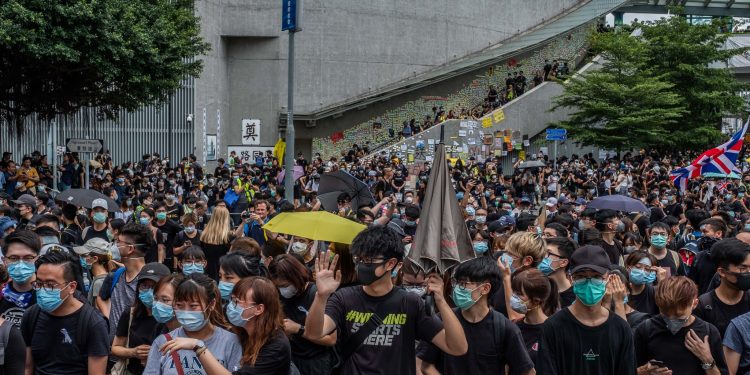Hong Kong: Thousands of protesters converged on Hong Kong’s police headquarters Friday, demanding the resignation of the city’s pro-Beijing leader and the release of demonstrators arrested during the territory’s worst political crisis in decades.
The latest protest comes after the government refused to meet the demands of demonstrators who have marched in their millions to oppose a bill that would allow extraditions to the Chinese mainland.
Opposition groups, after putting on the biggest political rallies in Hong Kong’s history, have called for the complete withdrawal of the extradition legislation and for city leader Carrie Lam to step down.
But the movement has also morphed into a wider expression of public anger at Lam and party leaders in Beijing after years of sliding political freedoms.
Throughout Friday the predominantly young, leaderless protesters used spontaneity and movement to up pressure on authorities, deploying peaceful civil disobedience.
After meeting at Hong Kong’s main government complex before rush hour, hundreds of black-clad protesters — many wearing face masks and shouting anti-government slogans — temporarily blocked a major city artery.
They then marched in the searing heat to the police headquarters, many chanting ‘release the righteous’ and ‘shame on police thugs’ — references to those detained during violence last week between demonstrators and the police.
Some used unfurled umbrellas to block CCTV cameras outside the police headquarters.
Opposition groups have demanded an investigation into allegations of police brutality and the release of those detained during the clashes, in addition to Lam’s ouster and a cancellation of the extradition bill.
Rights group Amnesty International said it had verified multiple instances of police violence that breached international laws and standards on the use of force.
Some protesters removed metal barricades and re-arranged them in an apparent bid to fortify their positions outside the police headquarters, as officials closed the gate to the facility’s main driveway.
Police held back from any response and a senior officer told reporters a negotiating team would be sent to speak with the demonstrators.
Separately, a smaller group of protesters briefly blocked entrances to the city’s nearby immigration and revenue departments.
“We need to flow like water”, to be able to retreat and regroup and adapt, said protester Chris, referencing a famous quote from martial arts superstar and Hong Kong legend Bruce Lee.
Another protester likened the crowds to artificial intelligence. “They learn from themselves, nobody really teaches them, they just adapt to different situations,” said Bernard, 21.
The call for Friday’s demonstration was made by the city’s student unions, as well as informal organisers over social media and messaging apps like Telegram.
“Blossom everywhere,” read a statement circulated Thursday in a Telegram chat group.
Lam has so far defied calls to step down, and while she has apologised and suspended the bill indefinitely, it has failed to quell anger.
Although Hong Kong was returned from British to Chinese rule in 1997, it is still administered separately under an arrangement known as ‘One country, two systems’.
The city enjoys freedoms unseen on the mainland but many residents have been alarmed in recent years by what they feel is a tighter grip by Beijing.
Opponents of the extradition bill fear it will ensnare the people of Hong Kong in mainland China’s opaque and politicised justice system, and also give Beijing a tool to target critics based in the semi-autonomous territory.
The Chinese government had supported the extradition proposal, and accused protest organisers of colluding with Western governments.
But Beijing said after the bill’s suspension that it respected and understood the decision.
Separately on Friday, former Philippine foreign minister Albert del Rosario — a critic of China’s claims in the disputed South China Sea — was denied entry into Hong Kong and deported, his lawyer said, adding that he was not given a reason for the expulsion.
Hong Kong immigration authorities did not immediately respond to AFP’s request for comment on the matter.
AFP






































